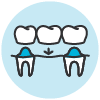What’s involved in a dental crown procedure?
A dental crown requires two appointments.
Your dentist will prepare your tooth for a new crown during your initial appointment. After shaping the tooth, our state-of-the-art digital scanner captures a 3D scan of the area. This digital scanning technique ensures precise results and a comfortable patient experience, while eliminating the mess and discomfort associated with traditional dental impressions. The digital impression is then sent to our skilled dental lab technicians, who craft your custom-made crown.
At the end of your initial appointment, a temporary crown will be placed over the prepared tooth to protect it until your permanent crown is ready.
The dentist will replace the temporary crown with your permanent one at your second appointment. The dentist will take time to ensure the new crown is a perfect fit, checking your jaw alignment and bite.
How do I care for my temporary dental crown?
A temporary crown is a short-term fix until your permanent crown is ready. There are certain precautions that should be taken:
- Avoid chewy or sticky foods (eg caramel and chewing gum) which can stick to the temporary crown and pull it out
- Avoid hard foods (eg nuts and raw vegetables) which can break or dislodge the temporary crown
Is a dental crown procedure painful?
During the dental crown procedure, the area is numbed completely with local anaesthetic, so no pain is felt. Afterwards, once the anaesthetic has worn off, some discomfort or soreness may be felt around the gum area where the crown was placed, over the counter pain medication should alleviate any discomfort.
Why do we use porcelain dental crowns?
Porcelain, a type of ceramic, is a very good material to use in dental procedures as it can be formed to the shape of a natural tooth. It looks virtually identical, as it can mimic the tone and translucency of dental ivory. For this reason, it is often recommended for prominent front teeth, but is equally appropriate for large molars at the back of your mouth.
Porcelain is also a bio-compatible material, which means it causes no gum irritation or allergic reactions. A porcelain crown feels like just another natural tooth.
How long do dental crowns last?
Unlike natural teeth, dental crowns don’t last forever. On average, they last up to 15 years. It’s important to remember that the tooth underneath the crown can still experience decay if not properly cared for.
Much like your natural teeth, their longevity is dependent on good oral hygiene, which involves regular brushing and flossing, as well as six-monthly check-ups with one of our dentists.

















